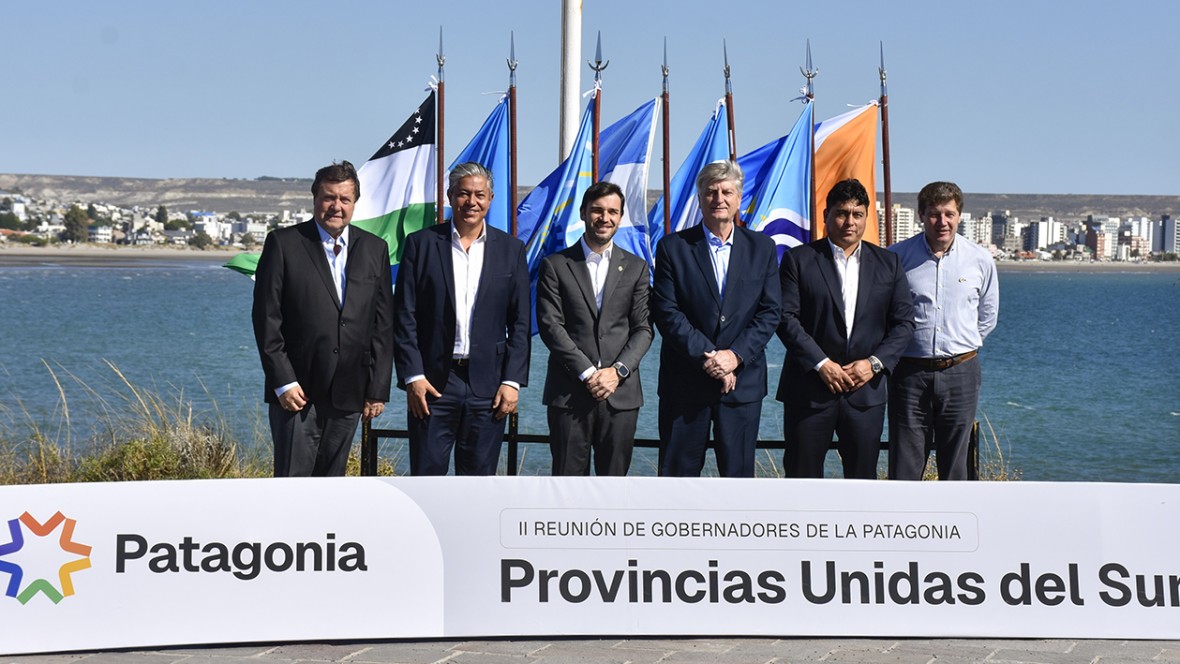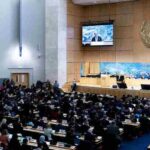
Against the background of the bid for the distribution of federal co-participation and other national funds, the Assembly of Governors of the 6 provinces that make up the Patagonian region. The leaders of Chubut, La Pampa, Río Negro, Neuquén, Tierra del Fuego and Santa Cruz, relaunched the Patagonia region, the Permanent Forum of the Patagonian Provinces and the Patagonian Development Agency .
The Puerto Madryn Declaration -city in which the Patagonian Parliament was held- decided to reactivate the Treaty of Santa RosaLa Pampa, signed in 1996, after the 1994 constitutional reform that enabled the creation of shared regions and superstructures for economic and social development.
The governors are fighting with the national government for a cut of the income for the distribution of the natural common goods of the region, energy and fishing among others, and demand a new co-participation law that, as they point out in the meeting document “must establish a new “according sharing scheme” that will enlarge the checkbook of the extractivist consensus in the Patagonian provinces and the business for national and foreign companies.
A fight that seeks to confront the extortion of the national government with the cut of the federal co-participation and the ATN (National Treasury Contributions) with another extortion, that of the participation of the profits derived from the exploitation of natural common goods. a fight between vultures in which working people pay the costs.
In the Declaration, along with the reactivation of the Treaty of Santa Rosa, the creation of the Permanent Forum of the Patagonian Provinces, to articulate a block of 18 senators and 30 national deputies who act jointly before both chambers of the National Congress. A force that, faced with a national government, a minority in both chambers, would be very useful in seeking the desired quorum to impose its reactionary laws.
The launch of the Patagonian Economic Development Council and the creation of a common energy company were pending.
The Patagonian governors made evident their decision to put the productive potential of the region on the discussion table and stated that “Patagonia contributes to the national economy 98% of gas, 87% oil, 71% of wind energy and 27 % of hydroelectric energy. It concentrates the bulk of its fishing catches in its adjacent sea and most of the landings in this resource in its ports.” Under these arguments, they demand a new federal co-participation law and to keep the hydroelectric dams in the region, which have already expired or Their concessions expire and it is disputed whether they pass to the national State or to the provincial States.
What was not under discussion in the meeting between the Patagonian leaders is their agreement with the adjustment that the national government has been carrying out since December 10as stated by Governor Torres of Chubut, every time he has a microphone in front of him, who with the consent of the provincial legislature imposed a law that attacks the labor right of teachers to get sick and the right to strike, similar to the one promoted Milei with his attempt to declare education an essential service, in the agreement to place the burden of adjustment on workers and retirees, managing to maintain the salary of teachers in his province among the lowest in the country, in imposing the Unified Security Command promoted by Patricia Bullrich in the province and in relaunching an extractive offensive that puts a new mining offensive, green hydrogen, wind energy, and control of dams in the making.
Because there are all these agreements between the governors and the national government, which Torres illustrated with his definition that “90% agrees,” today they will go to the first meeting of governors towards the May Pact, Let’s see who has the greatest power of extortion, whether the libertarian president with his chainsaw and blender plan, or the Patagonian provinces and their control of a large part of the natural commons that contribute billions of dollars to national coffers.
This Patagonian meeting also showed that there are no cracks between official supporters, collaborators and opponents, since all political spaces were present and agreed to this proposal. The leaders of the CGT could not be missing, who did not want to be left out of the photo and applauded this meeting, while the dismissals of thousands of UOCRA workers advance due to the paralysis of Public Works, there are SUPA leaders under house arrest after a surprise strike in the port of Rawson, after an employer lockout that paralyzed the fishing industry for a month, due to a demand for a salary increase or the situation of public education and its teachers.
This makes it clear, on the one hand, that If Milei and the governors advance in their adjustment it is because they have the collaboration of Peronism that argues on social networks but that, as in Chubut, voted for all the laws for Nacho Torres and continues with the passivity of the union centerswho after the strike on January 24 decided to return to the threats of a general strike, but never made it happen.
The opposition to this plan of adjustment and plunder was in the streets of Puerto Madryn repudiating this summit. The counter-summit convened by the Assembly in Defense of the Territory, was attended by Mapuche-Tehuelche indigenous communities, scholarship holders and researchers from Cenpat-Conicet, members of the Assembly of Self-convened Neighbors of Trelew and the Assembly of People Affected by the DNU of the Andean Region, and the left referenced in the Left Unity Front.
This opposition that has been developing from below, has the challenge of extending the incipient process of organization expressed by the neighborhood assemblies, together with the tradition of struggle of the environmental assemblies and the indigenous peoples in an open provincial meeting or assembly, which unifies all those affected by Milei’s chainsaw and blender plan and governors like Torres to strengthen the fight from belowamong workers, women and youth to demand and impose on the union centers a general strike and a plan of struggle until the Milei adjustment is defeated.
Puerto Madryn Declaration


Source: www.laizquierdadiario.com

